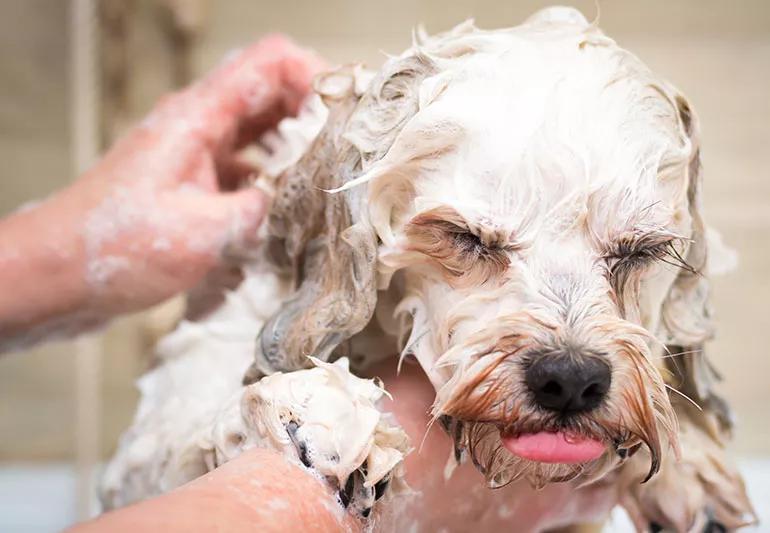Expert tips from an allergist

Image content: This image is available to view online.
View image online (https://assets.clevelandclinic.org/transform/7a081c36-104e-4d81-9296-f66a4427ddf9/dog-bath-646847616_jpg)
dog having a bath
Approximately 50 million Americans suffer from seasonal allergies. Whether it’s trees, grass or ragweed causing allergy symptoms, one thing is for sure ― it’s best to leave outdoor allergens … outdoors.
Advertisement
Cleveland Clinic is a non-profit academic medical center. Advertising on our site helps support our mission. We do not endorse non-Cleveland Clinic products or services. Policy
Allergist Sandra Hong, MD, says one extremely common way outdoor allergens make their way inside are on our furry friends.
“If you have pets, they’re covered in the pollen. So once you bring them in, and you’re hugging on them, you’re definitely going to have pollen indoors,” Dr. Hong explains.
And if they sleep with you ― it’s like you’re bringing the tree into your home.
To keep dogs and cats from bringing outdoor pollens into your home, Dr. Hong says it’s best to bathe them regularly. It’s also a good idea to keep pets out of the bedroom at all times, and especially out of the bed.
You might forget about it, but Dr. Hong reminds people that allergens can travel on our clothes and skin too.
So it’s wise to shower before climbing into bed to avoid spreading those allergens all over your sheets and pillows.
If you find that your eyes get very irritated during allergy season, she suggests wearing protective goggles while outdoors ― or protective eye wear ― to help keep pollens out of your eyes.
To keep allergens from camping out in your sinuses, Dr. Hong recommends using a saline spray.
“One of the things I’ve really had my patients consider doing is getting some sort of saline spray ― it’s like giving your sinuses a bath,” she says. “If you actually rinse out the pollens once you’ve come into your home, they’re not going to sit in there all night long causing allergy symptoms.”
Advertisement
Last critical tip? Keeping windows closed during allergy season is a must for those who have an allergy sufferer in the home, Dr. Hong notes. It’s also a good idea to keep car windows shut when pollens are especially active.
Advertisement

Delivered every Tuesday!
Sign up for our Health Essentials emails for expert guidance on nutrition, fitness, sleep, skin care and more
It's a letter about the news!
Learn more about our editorial process.
Advertisement
Every season comes with its own set of allergens
Eye drops and cold water rinses can help speed up healing for viral and allergen-related conjunctivitis, but a bacterial infection will need antibiotics
Most recommended precautions center around minimizing bruising or swelling
Even one drink can have an impact on your cognitive function leading to slurred speech, blurred vision and impaired memory
Understand who may (and may not) benefit
Lorem ipsum dolor sit amet. Et odio Quis vel ipsam omnis eum alias deleniti et placeat impedit non voluptas galisum hic autem enim et cupiditate aliquid. Est beatae quidem non facilis autem ut commodi nisi aut tempore rerum et dolores voluptatem cum enim optio id sapiente quasi. Ad laboriosam officiis 33 cupiditate sequi ea voluptatum consectetur qui necessitatibus voluptate et quasi doloremque et facere explicabo quo explicabo officia
Type 2 diabetes isn’t inevitable with these dietary changes
Applying a hot or cold compress can help with pain
Pump up your iron intake with foods like tuna, tofu and turkey